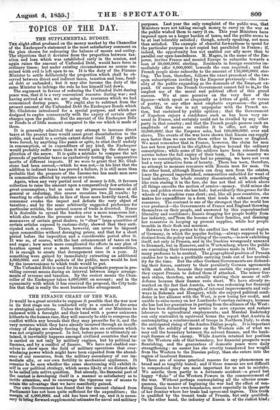TOPICS OF THE DIY.
THE SUPPLEMENTAL BUDGET.
TEE slight effect produced on the money market by the Chancellor of the Exchequer's statement is the most satisfactory comment on the plan chosen for redressing the balance of means and outlay. The objections that it deviates from the proportion between tax- ation and loan which was established early in the session, and again raises the amount of Unfunded Debt, would have force in ordinary times; but under existing circumstances no course un- mixed with evil is left open to us. It is the duty of the Finance Minister to settle deliberately the proportion which shall be ob- served between direct and indirect taxes, taxation and loan, fund- ed debt or unfunded ; but it may also become the duty of the same Minister to infringe the rule he has himself laid down. The argument in favour of reducing the Unfunded Debt during peace was, that it is a very convenient resource during war ; and having arrived at war, we are using the resources which we had economized during peace. We ought also to subtract from the present amount of the Unfunded Debt the Exchequer Bonds which Mr. Gladstone introduced for a special purpose, and which are designed to expire concurrently with the expiry of certain other charges upon the public. But the amount of the Exchequer Bills or Bonds is of little moment compared to the use which is made of them.
It is generally admitted that any attempt to increase direct taxes at the present time would cause great dissatisfaction to the public, and would to a certain extent defeat itself. If the public were forced, by anything like panic or spite, to stint itself unduly in consumption, or in expenditure of any kind, the Exchequer would probably suffer more than it would gain by the direct ap- plication of the screw. It is quite a mistake to compare the net proceeds of particular taxes as exclusively testing the comparative merits of different imposts. If we were to grant that Mr. Glad- stone had been correct,—which he was not,--in his hint that the addition to indirect taxes has proved a failure, it is still more than probable that the pressure of the Income-tax has made men save in commodities affected by customs or excise.
Again, when any very partial need of money is felt, it favours collection to raise the amount upon a comparatively few articles of great consumption; but as soon as the pressure becomes at all general or enduring, this course occasions two sill results : by resorting to other articles in lien of those more heavily taxed, the consumer evades the impost and defeats the very object of taxation ; and by the same arbitrarily suggested preference for particular articles, the natural course of trade is diverted. Hence it is desirable to spread the burden over a more numerous list ; which also renders the pressure easier to be borne. The recent manceuvre of certain great dealers, to " clear" large quantities of certain articles exposed to customs.duty, showed that they anti- cipated such a course. Taxes, howevee, can never be imposed upon commodities without deranging prices, and that for a short period before the imposition and a considerable period after it. It was so, of course, with the last enhancement of taxes on tea and sugar ; how much more complicated the effects in any plan of taxation spread over a more numerous class of commodities. It is enough to create that derangement once in a year. If something were gained by immediately extracting an additional 4,000,000/. out of the pockets of the public, more would be lost by the inconvenience to which trade would be put.
The Unfunded Debt is used for its most legitimate purpose in pro- viding current means during an interval between larger arrange- ments of revenue and taxation. By the easiest means the Chan- cellor of the Exchequer takes 4,000,000/. on account ; and in the equanimity with which it has received the proposal, the City testi- fies that that is really the most business-like arrangement.


























 Previous page
Previous page